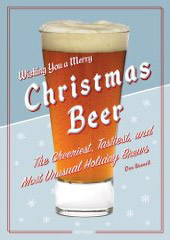 Don Russell’s Christmas Beer: The Cheeriest, Tastiest, and Most Unusual Holiday Brews
Don Russell’s Christmas Beer: The Cheeriest, Tastiest, and Most Unusual Holiday Brews came out last year while we were in Europe. Thus I write from experience when I suggest this is not a book you want to start reading in January, when these beers have disappeared from the shelves.
A few facts: The book is a packed 208 pages, with extra details with his choice of “The World’s 50 Best Christmas Beers.” Of course he’s wrong about some of them, but makes up for it with vitals on 98 more. Then there are recipes, serving tips, places to drink, all the expected extras.
Research was serious work, as Russell explains at the outset. He writes, “So every year I pick a day in early December to skip work and go beer hunting. One year I flew to Norway for its holiday beer, juleøl. In other years, I’ve trooped off to the West Coast. Most years, though, I stay on the East Coast for a beer-hunting expedition that can last twelve hours and take me though five states, plus the District of Columbia.”
Why you’d buy the book:
– The front matter. The book begins with a series of short stories, most two to four pages. In our house we haul out a couple of dozen Christmas books each Thanksgiving. The tales inside are surrounded by illustrations, so can can read a book out loud (more popular when Sierra couldn’t yet read) in only a few minutes. Same with the stories at the front of Christmas Beer. Read a story, have a beer. Repeat tomorrow night.
– The list of beers. I’ll forgo my usual rant against “best” lists. In this part of the book you see a beer on one page, the story of the beer on the facing page. Always a better story than the marketing people include in their press releases. And, of course, the attraction of these special beers is they tell their own story. So if you plan to spend the proper amount of time with the book, a short story and a beer each evening, and you take into account the front matter, then the 50 “best” beers, and sampling all the other beers listed . . . we’re already behind on Christmas of 2009.
– I makes a great gift. It would be on my wish list if I didn’t already have it.
Why you wouldn’t buy the book: Your name is Scrooge.